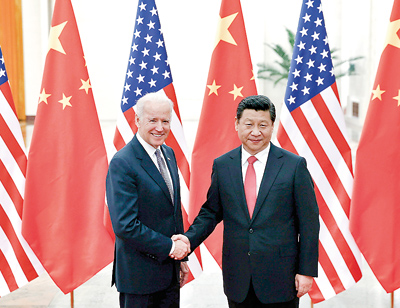Sunday Times 2
US looks to manage, not end, China air rift
View(s):WASHINGTON, Dec 7(AFP) -The United States has strenuously objected to China’s new air zone over islands managed by Japan, but experts say its best hope is to contain rather than end tensions. After Beijing last month declared an Air Defense Identification Zone in the area of the East China Sea, asking foreign planes to identify themselves, the United States defiantly flew through B-52 jets. US allies Japan and South Korea followed suit.

Chinese President Xi Jinping shakes hands with US Vice President Joe Biden (L) inside the Great Hall of the People in Beijing on December 4 (REUTERS)
But in Washington, few are holding their breath that China — where hostility toward Japan runs deep — will reverse its decision. President Barack Obama’s administration has instead put a priority on preventing an escalation.
Vice President Joe Biden met Wednesday for more than five hours with Chinese President Xi Jinping.
He said later of his talks in Beijing: “I was absolutely clear on behalf of my president: We do not recognize the zone. It will have no effect on American operations. Just ask my general — none, zero.” But the United States has not explicitly called on China to rescind the zone and instead has called on China to set up an emergency hotline with Japan to prevent a mishap between the world’s two largest economies.
“The possibility of miscalculation — mistake — is real and could have profound consequences for your generation,” Biden said Friday at Yonsei University in Seoul.
Japan administers the tiny Senkaku islands, which China calls the Diaoyu and links to Tokyo’s imperialist past.
Japan’s conservative Prime Minister Shinzo Abe has vowed no compromise on sovereignty and stepped up defense spending, believing that China is trying to change the status quo through growing sea incursions.
Several US-based experts suspected that China had goals beyond its row with Japan. China, which has been ramping up military spending over its past decade of strong economic growth, also has tussled with the Philippines and Vietnam over maritime territories.
“I don’t see the Chinese rolling it back. I don’t think for domestic political reasons that that would be an easy thing to do to begin with,” said Sheila Smith, a senior fellow at the Council on Foreign Relations.
“They clearly have, I think, done it with the intention of pursuing aims that are far beyond the China-Japan island dispute. I think it’s a bigger piece of their strategic puzzle. So I think management is where we probably should focus our attention,” she said.
A warning for the future
The United States, while insisting it does not take sides on sovereignty disputes, has said that the islands in the East China Sea are under Tokyo’s management and hence come under a security treaty in which it is required to defend officially pacifist Japan against attack.
With several nations concerned about China’s rise, Obama has declared Asia to be a top priority and shifted naval resources there, although the United States is also reducing military spending — which is more than four times China’s official level — to tame a debt from wars in Iraq and Afghanistan and a recession.
Zheng Wang, a professor at Seton Hall University, said that the US reaction to the air zone would discourage Chinese policymakers if they consider similar moves elsewhere — such as in the South China Sea.
“I think there are several indicators suggesting that the response from the outside is beyond Chinese expectations. So if they can learn the lessons, I don’t think they will make similar announcements in the near future,” he said.
Japan-ASEAN summit statement to call for free airspace over high seas-Kyodo
TOKYO, Dec 6 (Reuters) – Japan and the 10-member Association of Southeast Asian Nations are set to call for freedom of airspace over the high seas in a communique at next week’s Tokyo summit, a move directed at China’s aviation defence zone, Kyodo news agency said.
A draft of the joint statement also expresses the resolve of Japan and ASEAN to bolster cooperation in maritime security, Kyodo said on Friday. ”The Air Defence Identification Zone is already an international issue. The meeting would lack edge if a strong message could not be issued (on the matter),” Kyodo quoted an unnamed Japanese diplomatic source as saying.
Japan and four members of ASEAN — Vietnam, the Philippines, Brunei and Malaysia — all have territorial disputes with China in either the East or South China Seas.
The Tokyo summit to mark the 40th anniversary of Japan’s ties with the ASEAN comes after China last month declared an air defence identification zone in an area that includes islands at the heart of a territorial dispute with Japan, triggering protests from Tokyo, as well as Washington and Seoul.
In announcing the new air defence zone, China warned it would take “defensive emergency measures” against aircraft that failed to identify themselves properly in the airspace, raising regional tension.
Kyodo said a draft of the summit’s statement stresses the importance of the freedom of aviation over the high seas and pledges Japan and ASEAN to contribute to the peaceful development of international aviation order. The three-day Tokyo summit is scheduled to start on Dec. 13.


